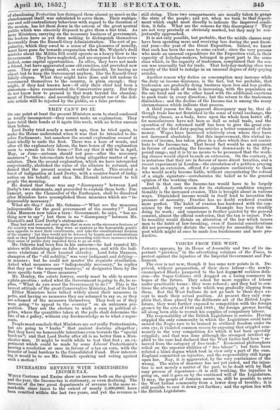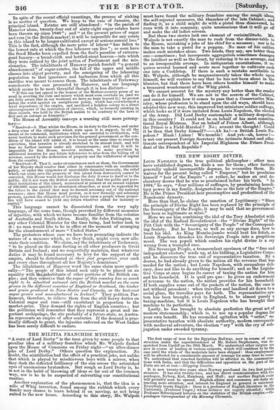VOICES FROM THE WEST.
JAMAICA appears, by its House of Assembly and two of its im- portant "parishes," in the advertising columns of the Times, to protest against the injustice of the Imperial Government and Par- liament.
The case is not new, though it has some new points in it. De- prived, without preparation, of their slave labour—the newly- emancipated Blacks pampered to the last degreettof reckless delu- sion—the Sugar Colonies still dragged on a losing commerce in hopes of the future. They asked for more supplies of labour under practicable terms : they were refused ; and they had to con- tinue the attempt § at a trade which was gradually slipping from them. But the West Indians do not go back to those days ex- cept to mark their actual position. At present they only com- plain that, thus placed by the deliberate act of the British Legis- lature, they were further exposed to competition with the foreign grower by the acts of 1846 and 1848; the foreign grower having all along been able to recruit his supplies of compulsory labour.
The responsibility of the British Legislature is serious. Having crippled the only community in which the Legislature could have caused the Negro race to be trained to civilized freedom under its own eye, it violated common reason by exposing that crippled com- munity to the very competition for which it had been specially crippled; and that was done although the strongest intellect ap- plied to the case had declared that the West Indies had been " re- moved from the category of free-trade." Economical philosophers relied on the superior abilities of "free labour"; but facts have refuted a blind dogma which took in view only a part of the case. England committed an injustice, and the responsibility still hangs upon her. Nay, it is aggravated, by the very continuance of the wrong. The series of disasters has not yet ended, and the injus- tice is not merely a matter of the past, to be dealt with by that easy process of repentance—it is still working, the injustice is going on, and it goes on by the continued will of the Legislature. It may, the people of Jamaica assure us, stall be possible to save the West Indian community from a lower deep of trouble ; it is still possible to cast it down yet further; and the option lies with the British Legislature. In spite of the recent official vauntings, the process of sinking is no matter of question. We keep to the ease of Jamaica, the
principal island. Estates are still abandoned : "in the parish of Hanover alone, twenty-four out of sixty-eight sugar estates have been thrown up since 1846"; and" at the present prices of sugar and rum [in the British market] it will be impossible for any estate in this island to be longer cultivated except at serious annual loss." This is the fact, although the mere price of labour "has fallen to the lowest rate at which the free labourer can live " ; so soon have the freed Blacks been expelled from the fool's paradise of extrava- gant luxury—a broad-cloth and bottled-stout heaven—into which they were enticed by the joint action of Parliament and the mis- sionaries. The inhabitants of Hanover parish foretell "a general abandonment" of sugar-estates, the fall of the upper and middle classes into abject poverty, and the consigning of the labouring population to that ignorance and barbarism from which all this sacrifice was meant to rescue them. The inhabitants of Trelawney corroborate the case presented by Hanover, and use language which seems to be more threatful though it is less distinct-
" If this our last appeal to the honour of the Mother-country prove of no avail in averting the rum and misery which must soon overtake us, (and we are fully aware that in our weakness we have no hope beyond it,) we protest before the world against an unrighteous poiioy, which has overwhelmed a loyal dependency of the empire, and sacrificed a helpless colony to a direct encouragement of the institution of slavery, which, as formerly existing in these islands, was held by the British nation to be contrary to the laws of God and an outrage on humanity." The House of Assembly conveys a warning still more peremp- tory—
"Resolved-5. That whilst the House, in its duty to the Crown, and under a deep sense of the obligation which rests upon it to support, by all the means at its command, institutions which are essential to civilization, will never hesitate to make such provision for the general government as the con- dition of the island will admit of, it is bound at the same time to record its conviction that taxation is already stretched to its utmost limit, and will hear no conviction, increase under any circumstances ; and that it will be impossible for this House, however inclined, to make provision by additional taxation for any future deficiencies to arise from the falling off of revenue, caused by the destruction of property and the withdrawal of capital from the country.
"Resolved-6. That if, under eiroumstane,es such as these, the Government of her Majesty shall resolve that either in consonance with an unalterable policy, or under the exigencies of unavoidable financial necessity, the relief which can alone save the property of this island from destruction cannot be conceded, this House would not discharge the duty it owes to itself or to the public, did it not warn the British nation betimes, that the public and paro- chial institutions of this island, maintained at present at an annual expense of 350,0004 must speedily be abandoned altogether, or must be supported for the future to the extent that may be deemed necessary out of the national revenues; since this House must protest, as it now formally and solemnly protests, against the obligation of levying taxes upon a people whose proper- ties will have ceased to yield any return whatever either for industry or capital."
This language cannot be dissociated from the very ugly language, of the same tone, though provoked by different measures of injustice with which we have become familiar from the colonies of Australia and South Africa. Really, Sir John Pakington, or any other Colonial Minister for the time being, had better look to it : no man would like to be in office at the moment of arranging for the abandonment of more "United States."
The protesters whose case we have been presenting indicate the nature of a measure which, as they think, might even now alle- viate their condition. We claim, say the inhabitants of Trelawney, "to be placed on the same footing as all other producers in Great Britain and Ireland; and we respectfully maintain, that whatever duties it may be found necessary to levy for the support of the empire, should be distributed in their just proportion over each and every class throughout all her Majesty's dominions."
The inhabitants of Hanover word the same claim more specifi- cally—" The people of this island seek only to be plaPPd on an equality with the.inhabitants of other portions of the British em- pire; and they conceive that Me sugar of this country has as much right to be admitted untaxed into the British market as the corn grown in the different counties of England or Scotland, the timber and grain produced in Nova Scotia and Canada, or the beet-root sugar grown and manufactured in Ireland." 'They petition Par- liament, therefore, to relieve them from the still heavy duties on Colonial sugar and rum—still exorbitant in proportion to the market-price. They demand the rights of English counties ; but the politician will remember that they represent a great and im- portant archipelago, the site probably of a future state, as Austra- lia represents an empire of after centuries. If the demand is prac- tically difficult to grant, the injustice enforced on the West Indies has been sorely difficult to endure.



























 Previous page
Previous page